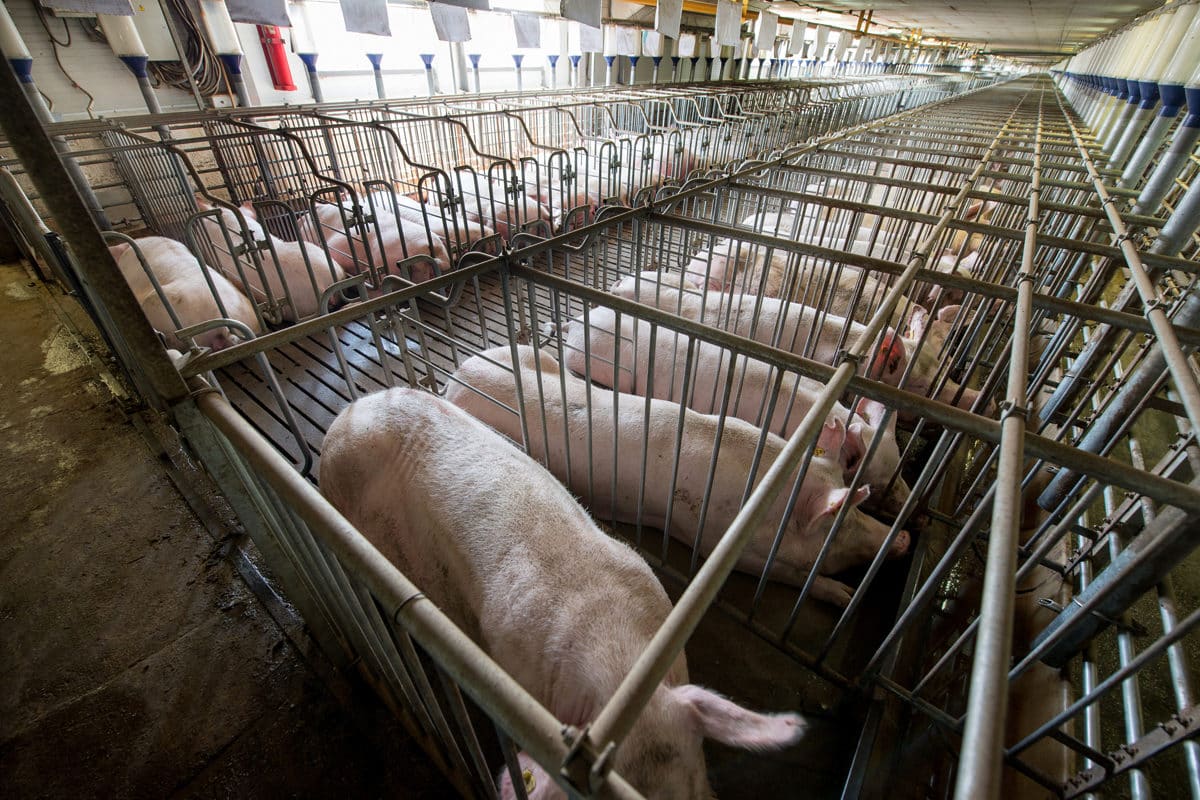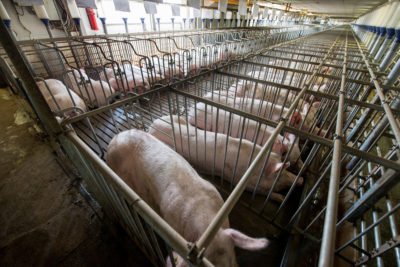
Provincial Government support for Hylife factory farm expansion not in best interest of taxpayers or animal welfare

WINNIPEG — The Winnipeg Humane Society (WHS) is questioning the value-for-money assessment and the decision by the Manitoba Government to hand out $2.0 million in taxpayers dollars towards the expansion of the Hylife factory-farm operation in Neepawa, Manitoba. In our view, this is not in the best interest of rural communities, taxpayers, and animal welfare.

The WHS believes investing the money in small operations so they can become more humane will bring additional jobs and improve the economy, make a positive impact on animal welfare, and reduce environmental risks. We are seeking to meet with Provincial officials as soon as possible to have a fact-based and respectful discussion about how taxpayer money can add value to the economy while reducing harm to animals.
“Large scale factory farming benefits corporations and their profits, but do little to tackle environmental issues, adds less jobs to the economy and it is cruel to farm animals. The industry standard measurements for sow stalls remains at 2 ft x 7 ft, this is unacceptable living conditions for any animal and does not conform to the five provisions of animal welfare,” said Javier Schwersensky, WHS CEO, “Intensive farming operations, like those of Hylife, do not allow for pigs to exhibit any of their natural behaviours which increases stress levels and animal suffering.“
There is a growing amount of scientific and economic research clearly indicating that support to small farm operations and incentives to convert to less intensive forms of livestock production (including conversion to organic farming) creates more jobs locally, commands a premium when it comes to prices, and does not reduce profits for small and medium-sized operations.
The previous Manitoba government enacted a moratorium on the hog industry expansion in 2010 based on the evidence and recommendations provided in the Manitoba Clean Environment Commission report. The report noted that increasing the number of hogs in Manitoba would be a significant increase in the phosphorus and nitrogen loads which may contaminate our water. Any increase in hog farm capacity in Manitoba will only exacerbate severe problems for Manitoba water quality.
In addition to this, if there are any acts of nature such as flooding in areas with intensive farm operations, the cleanup costs are extremely high and fall to the taxpayer, making this investment even more puzzling. This relates to what is currently happening in the United States after the devastation of Hurricane Florence.
“It is time to have a respectful, fact-based conversation about how to best use taxpayers’ dollars to support Manitoba farmers while at the same time improving the life of farm animals and reducing the environmental footprint of farm operations. The WHS believes all three goals are not exclusive of each other. Using taxpayer money to assist small-scale farms in adhering to a humane certification label or organic label creates jobs, reduces environmental impacts, reduces the number of animals being transported and turns it into a win-win situation for all involved. We can make choices and providing taxpayer money to large corporations may not be the wisest investment,” concluded Schwersensky.
Manitobans deserve to have a say in where their tax dollars are going. We urge everyone to voice their concern and to ask for a meaningful, respectful and fact-based dialogue about what type of incentives generate the most jobs, reduce environmental impacts and improve the welfare of farm animals in our Province.
The WHS will ask to meet with the Minister in order to present a value-for-money approach that has a positive impact on the use of taxpayers’ money while reducing the number of animals being confined inhumanely.
###
Background:
David J. Mellor, BSc (Hons), PhD, Hon Assoc RCVS, ONZM is professor in the Animal Welfare Science and Bioethics Centre at Massey University. Dr. Massey is also the Foundation Director of the Collaborating Centre for Animal Welfare Science and Bioethical Analysis. In 2016, Dr. Mellor presented at the Animal Welfare for a Better World 4th OIE Global Conference on Animal Welfare on the topic “Updating Animal Welfare Thinking: Freedoms, Provisions, Aligned Animals Welfare Aims and Lives Worth Living”. For more information see accompanying attachment or visit https://www.oie.int/eng/animal-welfare-conf2016/PTT/1.1.%20Mellor.pdf His presentation included the five provisions of animal welfare, which the Winnipeg Humane Society adheres to:
- Good nutrition
- Good environment
- Good health
- Appropriate behaviour
- Positive mental experiences
Winnipeg Humane Society
The Winnipeg Humane Society’s Animal Protection Committee (APC) is a volunteer-based group that works to eliminate practices which cause farm animals’ distress and suffering. Through educating and consulting with consumers, government, community organizations, businesses, and farm groups, APC advocates for a more humane Manitoba.
The Winnipeg Humane Society has a campaign to end the use of sow stalls, Quit Stalling, whereby over 90 % of pigs in factory farm are confined in 2`X7`cages unable to root, nest or turn around. Quit Stalling, a campaign to end the use of sow stalls. As well, drugs and hormones are routinely fed to these animals to combat the potential for disease outbreak, which is a much higher risk with so many animals so closely confined. These drugs are also given to speed up the animals’ growth.
The WHS encourages all Manitobans to take steps to reduce the consumption of meat and choose local farmers and humane certified products as a way to send a powerful message that factory farming is cruel and unnecessary, and insisting that politicians make the protection of animals a priority.
To learn more, please visit https://www.winnipeghumanesociety.ca/animal-issues/farm-animal-welfare/

